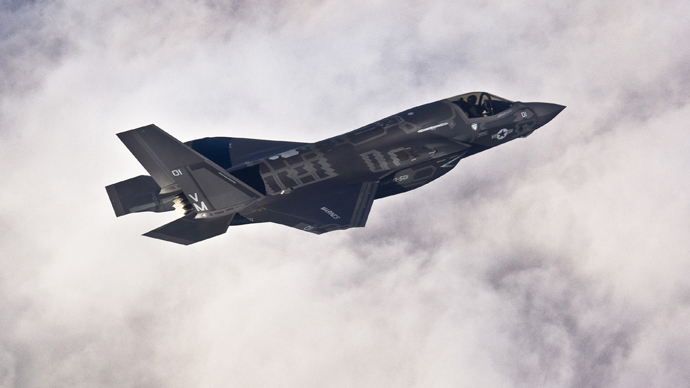Pentagon’s F-35 stealth fighter jet has a 'brain' problem

The software system for maintaining the F-35 fighter jet gives false-positive readings 80 percent of the time, the House Armed Services subcommittee has learned – a problem that could lead to even more delays with the jet’s development.
The software system for maintaining the F-35 fighter jet gives false-positive readings 80 percent of the time, the House Armed Services subcommittee has learned – a problem that could lead to even more delays with the jet’s development.
The F-35’s Autonomic Logistics Information System (ALIS), a next-generation software system designed by Lockheed Martin to identify maintenance issues, is plagued with problems and could delay development.
Meanwhile, in other defence news, big problems with F-35 fighter jet program… pic.twitter.com/4n7pt7NtlY
— Jason Fekete (@jasonfekete) April 14, 2015
Speaking to the subcommittee on Tuesday, Air Force Lt. Gen. Christopher Bogdan said “ALIS has a long way to go.”
“We have taken steps in the last two years to change fundamentally the way we develop ALIS, but it takes time to realize those results,” Bogdan said, the Airforce Times reported.
Bogdan said the maintenance software was a supplemental add-on and not a central part of the plane.
Members of the House Armed Services subcommittee heard from workers last month that the program is sluggish and slows down maintenance instead of streamlining the process.
READ MORE: LA Times sues Pentagon over bonus payouts for contractors of flawed $40bn defense system
“When we asked them how many false-positives, I thought it would be a high number because it is a new system,” said Rep. Mike Turner (R-Ohio), subcommittee chair, according to Investor’s Business Daily. “But when they said 80, I was taken aback.”
When asked by Chairman Turner about the false-positive readings, Bodgan said he would look into the numbers.
The software, which includes 5 million lines of code, is supposed to identify what is wrong and what is working on the jet, and provide information on identifying replacement parts. It has been called the F-35’s “brains.”
Turner told the committee that ALIS doesn’t have a spell checker and raised concerns about the software’s ability to catch errors worse than grammatical ones. The current ALIS system is in computer racks and weighs 800-1,000 pounds, which makes it cumbersome in combat environments. A smaller, two-man portable version is being developed which should be ready in July.
Last year, the Government Accountability Office found the ALIS failed to meet basic requirements like identifying faults and failures.












